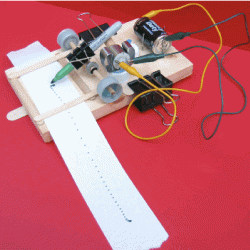Source Institutions
Source Institutions
Add to list Go to activity
Activity link broken? See if it's at the internet archive

In this activity, learners build a recording timer made from simple materials (e.g., small dc motor, sharpie pen, craft sticks, adding machine paper tape, etc.). The device produces a record of motion for things like toy cars, falling objects, etc. The resulting record, in the form of marks on the paper tape, can be used to tell the story of the motion, create graphical representations of the motion, and obtain information about displacement, velocity and acceleration. Learners can participate in the construction of the device or use pre-assembled timers.
- 5 to 10 minutes
- 1 to 2 hours
- Over $20 per group of students
- Ages 14 - 18
- Activity, Experiment/Lab Activity
- English
Quick Guide
Materials List (per group of students)
- wood base, 3/4 in x 5 1/2 in x 9 in (piece of 1x6 in shelving x 9 in long)
- 4 wooden craft sticks (popsicle stick size)
- 2 wooden craft sticks (tongue depressor size)
- motor, dc
- 2 alligator clip leads
- spring clip broom holder
- machine screw, 6-32 x 1/2 in
- electric drill
- 3 bottle caps from 2-liter plastic soda bottles
- 1 bottle cap from 500 mLwater bottle
- 2 binder clips, large (2 in, 51 mm)
- 2 binder clips, medium (1 1/4 in, 33 mm)
- push pin
- hot glue gun and hot glue sticks
- paper adding machine tape, 2 1/4 in wide
- stop nut with nylon insert, 6-32
- 2 washers, ordinary zinc-plated steel, 1/4 in
- drill bits - 3/16 in, 9/64 in, #50 wire gauge (1.78 mm)
- 2 rubber bands, narrow, approx. 3.5 in (size 19)
- 1.5 volt D battery
- wood dowel, 1/2 in, 1 in long
- wood dowel, 3/16 in, 5.5 in long
- marking pen (Sharpie Fine POint) with pointed or bullet tip (not chisel-point)
- 2 faucet washers, size 1/4 L flat or similar
- hammer
- 4 finishing nails, 1.5 in
- objects to drop including spring-driven toy car
Subjects
-
Engineering and Technology
-
Engineering
- Electrical Engineering
- Mechanical Engineering
- Technology
-
Engineering
-
Mathematics
- Algebra
-
Data Analysis and Probability
- Data Analysis
- Data Collection
- Data Representation
-
Measurement
- Rate
- Number and Operations
- Representation
-
The Nature of Technology
-
The Design Process
- Troubleshooting and Maintenance
-
The Design Process
-
Physical Sciences
-
Electricity and Magnetism
- Electric Motors
- Electric Circuits
-
Energy
- Work and Machines
-
Motion and Forces
- Momentum and Velocity
- Acceleration
-
Electricity and Magnetism
-
The Nature of Science
-
The Scientific Process
- Conducting Investigations
- Gathering Data
- Formulating Explanations
-
The Scientific Process
Informal Categories
- Electronics
- Toys
Audience
To use this activity, learners need to:
- see
- read
- touch
Learning styles supported:
- Involves hands-on or lab activities
Other
This resource is part of:
Access Rights:
- Free access
By:
- Rathjen, Don
Rights:
- All rights reserved, Exploratorium, 2007
